There’s an “airline geek” named Andy Smith who points out that (a) there’s a dusky twilight shot of the mythical 747 that Orlando Bloom’s character takes from Portland to Louisville in the trailer for Elizabethtown, and says (b) that this aircraft “is none other than Columbia Airlines flight 409 (obviously not a real airline) from the movie Airport ’75. You know…the one with crossed-eyed stewardess Karen Black trying to fly a plane with a large hole ripped into it from an air-to-air collision?” This has to be checked out. Bloom and Dunst flirting all alone in first-class, and Karen Black in the pilot’s seat? Awesome if true. Anyone?
 Jeffrey Wells
Jeffrey Wells
Stoned
The Family Stone (20th Century Fox, 11.4.05) looks like a hit because it has something for lightweight Sex and the City fans (you know…the ones who say they’ve enjoyed this or that film because it’s “fun”) as well as those looking for a quality deal with a little heart and gravitas. Sarah Jessica Parker is the nominal star of The Family Stone, although it’s primarily an ensemble dramedy with great performances all around, plus top-grade writing and directing from the unknown but obviously talented Thomas Bezucha.
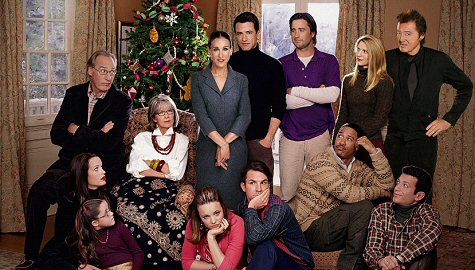
The Family Stone crew (l. to r.): Craig T. Nelson (on rug) Elizabeth Reaser, Savannah Stehlin, (seated) Diane Keaton, (on rug) Rachel McAdams, Paul Schneider (standing) Sarah Jessica Parker, Dermot Mulroney, Luke Wilson, (seated) Brian J. White, (on rug) Tyrone Giordano, (standing) Claire Danes, no comment.
The producer is Michael London, who also delivered Sideways. These two plus House of Sand and Fog and Thirteen, all made over the last two and a half years, have cemented London’s rep as one of the few guys who make classy personal films that bridge the line between big-studio polish and indie attitude.
Set in snowy New England (although exteriors were shot in Madison, New Jersey), The Family Stone is a home-for-the-holidays family pic with smarts and feeling and humor that’s simultaneously sensitive, abrasive and “real.” Tight, sharply written, enjoyably acted. I’ve seen it twice so far and I’m looking forward to more viewings.
People have asked me if The Family Stone is mainly a comedy or one of those heartfelt things. I tell them it’s kinda both. It’s not serious-serious, but there’s an emotional sincerity and a moment or two (or three) that gets you deep down. The main residue at the end is one of caring and closeness.
Question is, if you’re 20th Century Fox, who do you sell it to…the Parker fans (i.e., younger women) or people with the ability to savor more than just lively performances and clever dialogue and casseroles spilled on the kitchen floor?
The teaser one-sheet (which came out only two or three weeks ago) and the trailer provide an obvious answer — Fox is going for the Sex and the City crowd. That upraised wedding finger is catchy…it promises a comedy with attitude…and the trailer is selling an idea that Parker is the star of The Family Stone…which isn’t quite the case.
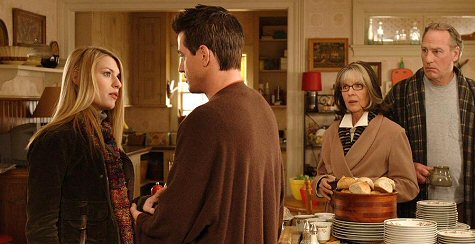
Danes, Mulroney, Keaton, Nelson.
She plays a provocateur who stirs things up among a large, earthy and liberal new-age New England family. This is a dynamic that vaguely resembles Moss Hart and George S. Kaufman’s The Man Who Came to Dinner, although the film itself is closer in spirit to George Cukor’s Holiday.
The Stone family is a brood of grown-up kids (Luke Wilson, Rachel McAdams, Dermot Mulroney, Tyrone Giordano, Elizabeth Reaser) and their late-50ish parents (Diane Keaton, Craig T. Nelson). Parker is Mulroney’s bring-home girlfriend whom everyone hates because “she doesn’t trust or know herself,” as Nelson’s character observes early on. She’s uptight, anal, buttoned-down and trying way too hard.
Thrown by the death-ray looks and other signs of disapproval, Parker pressures her sister (Claire Danes) to drop by to provide emotional support, and this in turn lays the stage for all kinds of upheavals, including two relationship re-alignments and a romantic rekindling.
Thing is, if I didn’t know anything and was just checking out the one-sheet and trailer like anyone else, I would probably be going “naaah…too sitcommy…a girl comedy.” And that’s not what this film is. I’m not the target audience, but if I was Joe Shmoe and I knew how this film actually plays, I’d have a different attitude.
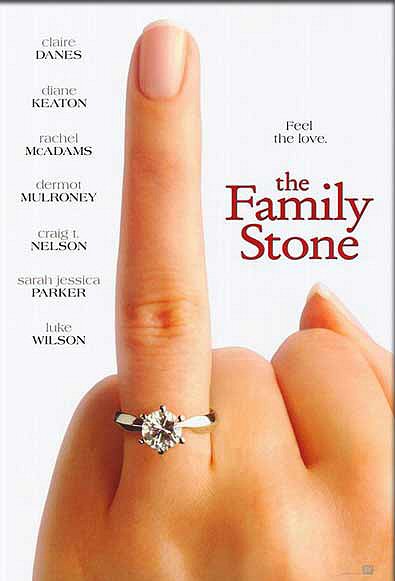
Three weeks before the new opening date (i.e., an 800-screen platform release on 11.4 followed by a wide break on 11.11), Fox seems to be re-thinking the pitch. A new poster has apparently been designed and is on its way out (Fox wouldn’t let me see it or display it for this article), but frankly…?
Changing the one-sheet campaign might broaden the audience a bit (and I hope it does), but big-studio marketers aren’t supposed to shuffle the deck this close to the release date. Not according to the rule book, anyway. Teaser one-sheets are supposed to be in lobbies three or four months before release, but the “real” poster should be out and displayed a couple of months before…six weeks anyway.
After last weekend’s disappointing opening of In Her Shoes I’m suppressing a concern. I’m worried that Fox might blow it again with another quality piece that it doesn’t quite know how to sell. And in this case, an emotionally intimate film that would be a Fox Searchlight release in a more perfect world.
I don’t expect this to happen, mind…and maybe the Sarah Jessica wedding-finger campaign is the way to go after all, but I’m feeling a tiny bit nervous.
Next month, remember, comes a whole ‘nother challenge for Fox with James Mangold’s Walk the Line, which is likely to be seen as a white Ray. It’s been made with great craft and has a pair of Oscar-level performances (Joaqin Pheonix, Reese Witherspoon), yes, but country music ain’t soul music….and those toe-tapping Ray Charles songs helped put Ray over.

Sarah Jessica Parker
Line will be a natural with the critics and the Academy, but selling it to the public is going to take some doing…let’s face it.
The Family Stone might turn out okay. I know that if a seemingly shallow person likes a film, that’s usually a good sign it’ll be a hit. I know this actress who knows this woman, see, and she went to The Family Stone last weekend and said it was “fun.”
Convincing a woman who enjoys escapist movies that a movie with real emotional substance is “fun.”…that’s like hitting the daily double. There are a lot more people out there who think like this than there are people like me. Girls who don’t wanna pickle, just wanna laugh …you’ve got them, you’re just about there.
I always use my sons as box-office barometers. Jett, 17, says he hasn’t seen the one-sheet and only caught the end of the trailer…no firm impressions. But he said “yeah, cool” when I told him it wasn’t a Sara Jessica Parker movie but more of a mixed bag with funny and sad stuff mixed in. Dylan, 15, says he doesn’t care and isn’t going.
I took an attorney friend to see it last weekend in Pasadena, and he liked it…who wouldn’t? But on the way out he said my liking it as much as I do is proof that I’ve become “a rank sentimentalist.”
Everyone says Keaton will be a Best Supporting Actress nomineee and yeah, maybe…but Parker is the one who tears it up and takes the big character journey. Nelson and McAdams are right-on, and Wilson has a fine time with the best role he’s had since Bottle Rocket.
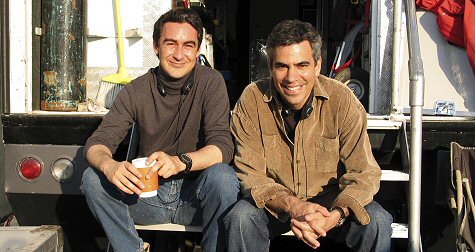
The Family Stone director Thomas Bezucha (l.), producer Michael London
The original title of Bezucha’s script, which kicked around for years and almost got made by indie-level producers twice before the present version came together late last year, was Fucking Hating Her and then Hating Her.
Wilson’s role of Ben Stone was reportedly going to be played in ’03 or ’04 by Billy Crudup, Steve Zahan and/or Aaron Eckhart…but I’m going by internet heresay.
Among the actors who were allegedly cast before and then left behind were Selma Blair (in the Claire Danes role of “Julie”), Bridget Moynahan (replaced by Parker); Blythe Danner (the Keaton role ), Donald Sutherland (replaced by Nelson), Maura Tierney (replaced by Reaser) and Johnny Knoxville (replaced by Mulroney…thank God!).
The only thing I don’t like about The Family Stone is the bubbly holiday music, composed by Michael Giacchino, heard over the opening credits. It says to the audience, “Boy, do we have a cute and cuddly movie for you!”
I hate it when musical scores try and establish an emotional mood before the film starts. (Unless it’s a melodrama or a cop film, in which case it’s fine…as long as the music isn’t “cute.”) We’ll get it soon enough, okay? Chill.
The Tighten-Up
With 18 minutes cut from the Toronto Film Festival version, Cameron Crowe’s Elizabethtown (Paramount, 10.14) is less of a chore to sit through…especially during the first half. It was hard to remember what was taken out, which means Crowe made a thousand tiny cuts rather than chop this or that scene. Crowe went back to the Avid after his latest film ran into bad buzz at both the Venice and Toronto film festivals in September.

Kirsten Dunst, Orlando Bloom in Cameron Crowe’s Elizabethtown
But there’s still that tone of dry farce and sentimental whimsy that never quite connects. You can feel it trying to win you over, and the more you’re aware of the effort the more you pull back.
And a second viewing has forced a realization that costars Orlando Bloom and Kirsten Dunst don’t feel that rooted to their characters or the film…or to anything else. They never seem to disappear into the story or the bedrock reality of it — all they seem to be doing is trying to make their line-readings sound spunky.
And a lot of those first-hour speed bumps are still there.
In the wake of his cloud-walking shoe flopping with the public and being returned to the factory, Bloom still says “I’m okay, I’m okay” to everyone. This makes you say to yourself, “This movie‘s not okay.”
It still doesn’t add up that a multi-millionaire shoe magnate (Alec Baldwin) would blow almost a billion dollars on Bloom’s Spasmodica. (Regional test marketing …hello?). I might have bought this if the losses were more in the range of $50 or $75 million or something, but $900 million is just dopey.

Orlando Bloom
Bloom’s co-workers still stare at him as he goes to meet Baldwin for the first stage of tongue-torturing and eventual termination. I said before (and everyone knows) that company employees never stare at a colleague who’s about to get whacked…they steal glances and then look away.
I know…Bloom’s character is imagining that everyone is looking at him, just like he imagines everyone in Elizabethtown is waving and offering directions when he first arrives.
Bloom still puts together that ridiculous suicide device (big carving knife duck-taped to a workout contraption) that he intends to use on himself. Stabbing yourself to death is…how to best say it?…a very whimsical way to go.
It still doesn’t add up that Bloom’s mom and sister (Susan Sarandon, Judy Greer) are averse to letting their dead ex-spouse/father’s body be buried in Elizabethtown. The guy moved there, lived there…why not let well enough alone instead of trying to bring the body back to Portland for cremation?
It’s still ridiculous that Bloom would be the only passenger on an overnight flight from Portland to Louisville (i.e., “Loo-ah-vuhl”), and on a 747 yet. (Since when are those behemoths used for 2,000-mile cross-country hops between mid-sized cities?)
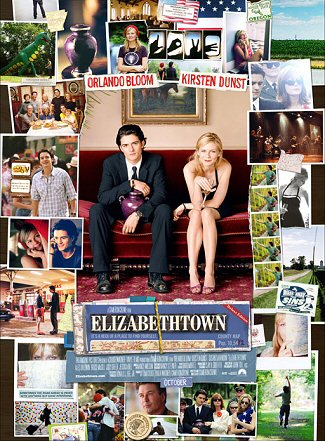
And that bit with the funny-looking, pot-bellied guy who’s about to get married going into an obviously insincere crying jag when Bloom tells him his father has died…this is a terrible moment. Fake, awkward, horribly acted…you just want it to end.
The only significant cut I noticed is that dispute between Bloom and his Kentucky in-laws about whether his father will wear a blue or a brown suit in the coffin.
I guess I’m saying that if all these pain-in-the-ass things are still in the film, then maybe it hasn’t been improved all that much. But it has been…I think, to some extent.
Elizabethtown starts to get better with the all-night cell chat sequence between Bloom and Dunst…except for the re-charging problem. Six or seven hours of straight cell-calling and only Bloom re-charges. It’s a very small matter, but why doesn’t Dunst plug in also?
As I wrote in Toronto, the last third is actually pretty good. And the final road-trip sequence delivers the basic theme (what is it we get from life that it joyful and nurturing…what makes us want to hang on with our last dying breaths?) rather touchingly.
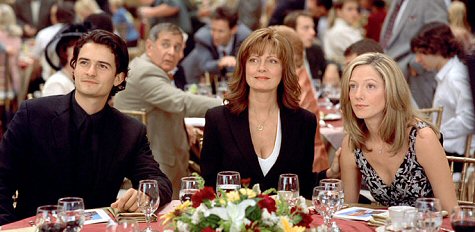
Bloom, Susan Sarandon, Judy Greer
It’s a better-crafted, obviously more ambitious film than Zach Braff’s Garden State, which everyone has been comparing it to for ages. The thing is this: even though Braff seems to have less on his mind he also has less to prove, making Garden State easier to sit through, even though it’s only a so-so film.
But of course, Elizabethtown has a great pop-song soundtrack …but that’s a given with any Crowe film.
I’m deeply indebted to Crowe for at least re-acquainting me with Tom Petty’s “Learning to Fly”, a song that I haven’t listened to since the Clinton era. It’s off Petty’s “Into the Great Wide Open” album, which came out in ’91.
I’m almost tempted to say buy the CD soundtrack and wait for the DVD, but the last third really is pretty good. And I’ve heard from some people who’ve liked the whole thing.
Other Trims
“It seemed to me that, aside from the argument scene between Bloom and the blowhard funeral home guy, most of the cutting done on Elizabethtown has been done in the last third.
“Sarandon’s speech at the memorial service seemed slightly shorter (and choppier) — do you think Jane Fonda has had a single moment of regret over not playing that role? — but Crowe left in the overwrought punchline. (The audience I saw it with chuckled when they first figured out what she was talking about, but they were silent by the time she started shouting out the specifics).
“I was surprised that Crowe kept the outlandish ‘Freebird’ scene, in which the audience keeps applauding and sitting in their seats as a flaming sculpture zooms around over their heads — absurd. The silly post-memorial service episode with the infuriated Chuck and Cindy is gone, and good riddance, so Crowe also had to snip the scene between Bloom and the desk clerk, who realizes the charges for his stay are going to be about $50,000, which was also ridiculous. (In these days of cutting every corner in the business world, there is no way a corporate credit card would still be valid after an employee left the company anyhow).

Sarandon, Greerm, Bloom
“I was also glad to see that the little deus ex machina postscript with the whistling shoes was dropped; even the generally friendly audience I saw it with at the gala screening in Toronto didn’t seem to buy that.
“But all the trims did absolutely nothing to improve the film itself, which still has major plot holes and miscast leads. What caused the shoes to be such a huge failure in the first place? And, yes, any product that was supposedly that “eagerly anticipated” would have been through quite a bit of research and testing during its eight-year development period.
“You’re also right about Dunst and Bloom. She strains to capture the airy-fairy quality that came so naturally to Kate Hudson in Almost Famous — it must be miserable for an actress to stuck with a role in which you do nothing except smile, turn your head and say things that make you sound like the secret love child of Rod McKuen and Tori Amos — and he seems painfully over-rehearsed. Everyone of his reactions seemed pre-processed and carefully planned out, which is certain death in comedy. The shots of him laughing to himself and crying in the car were utterly unconvincing, even though
“I liked most of the road trip itself. Bloom is easy to look at and a pleasant enough personality, but he cannot carry a film, something that has now been proven at least twice now in the past six months. Elizabethtown cried out for John Cusack, but actors like that aren’t easy to find.” — James Sanford
Futility
What happened with In Her Shoes last weekend? What does it mean for a movie this good and effective to earn a moderately cruddy $10 million dollars?
I realize the game isn’t over and word-of-mouth could it keep going, etc., but Shoes probably won’t even make $50 million, and I know it does the thing that big-studio “heart” movies are supposed to do, and I really don’t get it.
Al Pacino’s bullshit gambling film, Two for the Money, made $10 million last weekend also…good heavens. The theory going around last weekend was that young simians who don’t read reviews saw those Money trailers and felt the energy and said, “Hey…!”
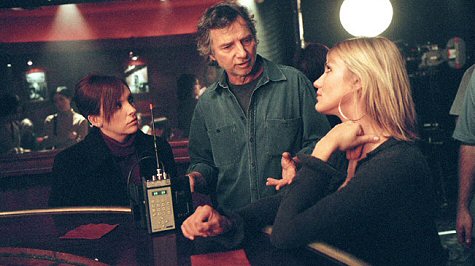
Toni Collette, director Curtis Hanson and Cameron Diaz during filming of In Her Shoes
What happened to the supposed big-time drawing power of Cameron Diaz, who collects a $15 (or is it $20?) million fee on the strength of her hold over younger women? If she can’t push a well-reviewed quality film into the mid teens on the opening weekend, what does that say?
In Her Shoes has grabbed every audience I’ve seen it with (caught up, perfectly still, no coughing or bathroom breaks) and over 70% of the critics went for it. A director friend (you know him) called me after catching it last Saturday and said he did the whole laughing-and-crying thing. He said it was so good he wished he’d written and directed it himself.
I know the Fox people have been wondering for some time about how to sell it to the under-25’s who don’t want to know from reviews and refuse to respond to anything except trailers and ads.
I think I can deal with this situation best by running this letter from Roderick Durham in Tallahassee, Florida. It’s about the vibe during a 2:10 pm showing of In Her Shoes last Sunday:
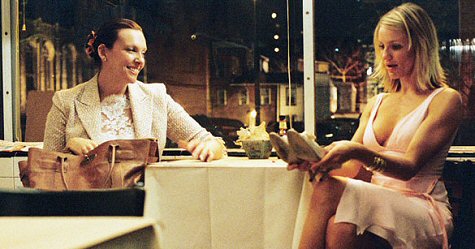
“The show almost sold out, and get this — at least half of the audience was men. Mostly with wives, girlfriends, etc. but guys all the same.
“There are times when you are in a movie, and the silence is because what you are seeing on screen is mesmerizing or so intense that you can’t look away, nor can you move. Nobody wants to look away or miss anything. The Wedding Crashers was like that. War Of The Worlds was like that.
“Then there are movies like In Her Shoes. No doubt every man in the joint had to piss like a racehorse at one time…but Jeff…not ONE man left. Some women left to use the bathroom and come back, but none of us did.
“Know why? Great storytelling and great acting make it so you can’t leave. That’s what this was. In the confines of the genre…well, it’s like you said…if it is a ‘chick flick’ then it is one of the better ones EVER made…because it transcends that genre.
“These actors, Curtis Hanson, Susannah Grant…great storytellers. And great EDITING…not a wasted scene, wasted performance. Every character was three-dimensional, to me…and though the women rule, Mark Feurerstein, Richard Burgi, the great Norman Lloyd (long shot, but you are right about his performance NEEDING to be nominated), Jerry Adler…all lovely work.
“The scene stealer that is Francine Beers brings the movie much joy…but the top three actresses give it the soul, you know?
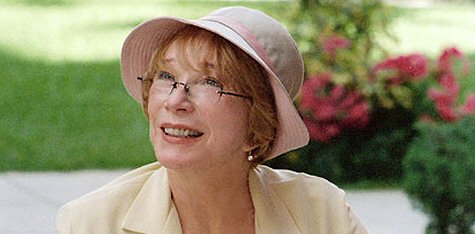
In Her Shoes costar Shirley MacLaine
“Shirley MacLaine — this might be my favorite performance of hers…even more than Terms of Endearment or (my favorite) The Apartment. So nuanced and just right on the money was her work here (loved the scene with she and Diaz at the table talking about Diaz’s new career as a shopper for the elderly).
“And Toni Collette…please. She gives too real and honest a performance not to be noticed. For me, so far this year of what I have seen, she gives the superior performance of the year. Hard to pull off what she does here. So good.
“Diaz will be overlooked, which is shameful since she proves herself an actress again here. The scene at the MTV audition…the great fight scene with she and Collette, and almost every scene in Florida…good for her.
“This is a lot, but when you see a successful commercial film…when a movie does what it is supposed to do, and even a bit more…well, one will go on about it. Thanks for the heads-up on this one. Any man who seriously can’t appreciate this movie has issues.”
Agreement
“So true about what Rod Durham says about In Her Shoes. I saw it last Friday after work and felt totally compelled by it… didn’t want to miss anything! This is the difference between a Curtis Hanson making this kind of film and a hack doing so.
“Shirley MacLaine has a moment when Jerry Adler steals a kiss from her. Her surprised reaction is worth an Oscar nod alone. Priceless!
“I did feel the last act dropped the ball a little, but not enough. A very good movie, which I’ve recommended. Weirdly enough, I raved about it to my sister, who told me she was turned off by the TV campaign. Despite my rave, she didn’t want to go. Interesting…” — Dixon Steele
Two changes with 20th Century
Two changes with 20th Century Fox’s The Family Stone. One, they’ve decided to do a platform-release on 11.4 (i.e., the original opening date) in 800-plus theatres, and then go wide on 11.11. (The theatre tallies were wrong before…sorry.) Two, they’re cooking up a new one-sheet that will presumably try to sell what it actually is (a sharply-written family comedy with heart) as opposed to whatever that upraised wedding finger one-sheet conveys. Which is what exactly? Marriage sucks?…my husband sucks?…I’ve changed my mind? It’s catchy (I showed it a woman friend who’s out of the loop and she went, “Aha!”) but it has nothing to do with the film.
I said before going to
I said before going to the Toronto Film Festival than I hoped Niki Caro’s North Country (Warner Bros., 10.14) wouldn’t just be another dramatization of a sexual-harassment issue, which seemed old-hat to me. And I’m afraid N.Y. Times writer Caryn James is also on the money when she says the following: “While it seems to be a film with a cause, [North Country] refights a battle that took place long ago. As one of the few women working in a mine, Charlize Theron faces insults and discrimination in a role that seems conceived with an Oscar campaign in mind. Women still suffer in jobs that have traditionally belonged to men, but the blatant discrimination her character faces — her boss flat-out says she has no right to take a job away from a man — has no vital connection to the present. A truly provocative film would deal with the backlash against sexual harassment laws, the contemporary sense that political correctness has gone too far. The sitcom ‘The Office’ (both the British and American versions), with its troglodyte boss and a human resources department that stages seminars on appropriate behavior, says more about harassment today.”
It occured to me last
It occured to me last weekend in the course of the Family Stone junket in Pasadena that right now, a healthy portion of the publicity team at 20th Century Fox is (a) female, (b) married and (c) with child and on the verge of going on maternity leave, or with recently arrrived kids at home. When Fox marketing exec Jeff Godsick was told a couple of weeks of still another impending birth and a request for maternity leave, he allegedly replied, “Hmmm…maybe I’m pregnant?”
Nobody cares about the James
Nobody cares about the James Bond casting process. I might have mentioned this once or twice before, but the franchise is a kind of cultural tumor…about a character and a mindset that has nothing to do with anything in our world today except for the bizarre fact that when a Bond movie opens several million people pay to see it (which I attribute to mindless habit)…about a character who mattered in the world of the early ’50s to early ’60s, and then degenerated into a fey figurehead of a series of special effects-and-gadgets movies during the ’70s and ’80s, and whose legend over the last eight to ten years has been further marginalized by the most clueless producing team in the history of mainstream filmmaking, Michael Wilson and Barbara Broccoli. That said, Variety‘s Katja Hoffman, quoting London’s Daily Mail, says that Daniel Craig has probably been chosen. I love this sartorial acknowledgement: “Brit thesp, who plays the second lead in Spielberg’s terrorist thriller Munich, would be the first blond Bond.” The clincher for me is that “Craig’s publicist only offered a ‘no comment'” to Hoffman, and that the authorities at Eon Productions, the producers of the Bond franchise, “were said to be ‘in a meeting.'” The only way the Bond franchise can ever really get going is for Wilson and Broccoli to be removed from the equation, which will never happen so forget the whole thing. Craig will pocket a nice paycheck and get to buy a much bigger home…great.
“I’ve always viewed life as
“I’ve always viewed life as material for a movie,” The Squid and the Whale director Noah Baumbach says to N.Y. Times profiler Deborah Solomon, and thereby flashing his hard-core obsessive filmmaker credentials. “I am sure there will be a backlash against The Squid and the Whale,” he also says, “but I am hoping it doesn’t kick in for at least three months. I do like having books on my shelves. I do value that life. I love Bob Dylan. And I love Philip Roth. I am reading ‘The Professor of Desire’ now, which is about the great Philip Roth struggle between being the good boy and being the bad boy. I have to remind myself to sit because my joints ache…I am the sort of person who is too anxious to sit down.” This settles it…anyone who frets and suffers and can’t sit down gets my vote.
That two-year Touchstone production deal
That two-year Touchstone production deal that has been handed to Rod Lurie and his Battle Plan Productions in the wake of Disney-owned ABC bouncing him off the new ABC hit series Commander in Chief, which Lurie created, in order to make way for the new creative honcho Steven Bochco….well, I’m told it’s pretty rich. Like $4 million rich. It’s face-saving tribute money. Lurie created the show, wrote it, ran the whole ship…and then (a) “creative differences” arose or (b) Lurie was overworked or (c) Disney/ABC felt the show could be better sculpted…whatever. They got Lurie to be cool and gracious about bowing out by handing him the $4 million as a kind of we-love-and-respect-you- but-we-need-you-to-go-away payoff. Lurie, an adult and a good hermano, will keep his exec producer credit and move on to other things, etc., and life will go on.
Doctor: [Your wife is] not
Doctor: [Your wife is] not so sick, my lord, as she is troubled with thick-coming fancies that keep her from her rest.
Husband: Cure her of that! Canst thou not minister to a mind diseased? Pluck from the memory of a rooted sorrow, raze out the written troubles of the brain and, with some sweet oblivious antidote, cleanse the stuffed bosom of the perilous stuff which weighs upon the heart?
Doctor: Therein the patient must minister to himself.
There’s one curious statistic in
There’s one curious statistic in Sharon Waxman’s N.Y. Times story about a new online study finding that Hollywood is “being jilted” by young males who are being lured away by video games and other digital activities. The readings said that guys-under-25 saw “24 percent fewer movies this summer than they did in the summer of 2003, when the same study was conducted. The drop in moviegoing was much smaller for women and for other age groups.” The study contacted 2000 people and used “a random, nationally representative sample of moviegoers who were queried online in August.” The odd bit comes at the end of a graph that says the study, conducted by a Los Angeles-based online reserach group called OTX, “echoed a finding about television viewing that was much disputed two years ago, when Nielsen Media Research charted a sharp decline in prime-time ratings among men ages 18 to 34. That finding, which delineated the growing fragmentation of the viewing audience…attributed to a rise in alternate activities, like video games.” And yet at the end of this graph, Waxman reports that “a year later, the viewership returned.” And what does that mean? (I’m lost.) Otherwise, the OTX study obviously reenforces last spring-and-summer’s concerns about a dwindling movie audience. It also seems to dispute the reported “new thinking” among studio execs, as reported by L.A. Times‘ Claudia Eller and John Horn not too long ago, that the fault, dear Brutus, lies in our crappy movies and not in the public’s changing entertainment habits.
There’s no rejoicing in Mudville
There’s no rejoicing in Mudville over the weekend’s box-office tallies, and particularly Wallace & Gromit‘s $4.2 million on Friday, which indicates a $13 or $14 million weekend…along those lines. Industry spitballers looked at the tracking and figured it would do a lot better…in the vicinity of at least $20 million, if not higher. And something is certainly wrong with the world when Flightplan, a movie that loses its grip in the final act and is now in its third week (having opened 9.23), nudges out In Her Shoes, $3.1 million to $3 million per Friday’s reported estimates. It looks like Shoes is heading for a $10 or $11 million weekend at best, and possibly a bit lower, which is a good $5 or $6 million lower than what handicappers were projecting. And Two for the Money, that piece-of-shit Al Pacino deranged-mentor gambling movie, registers the same $3 million Friday haul as In Her Shoes…? Nice going, U.S. ticket buyers. Don’t consider quality…just watch the TV ads and go with your gut. Hey!
I’ve been holding off saying
I’ve been holding off saying anything about Thursday’s firing of Par Classics co-prezzies Ruth Vitale and David Dinerstein by Paramount Pictures chief Brad Grey, and here it is Saturday and I still can’t think of anything very penetrating…sorry. And I am sorry about this. Ruth and David are good hombres. It’s totally routine, yes, for new studio heads to clear the decks and discharge in-place execs so they can bring in “their own people,” blah, blah. Grey’s brand-new Par Classics chief will be Lion’s Gate’s Tom Ortenberg, apparently. I have nothing to add to the irony of Ruth and David getting pushed out of the plane at the end of the most profitable period that Par Classics has ever had ($22 million or so earned by Hustle and Flow $8 million tallied by Mad Hot Ballroom). It seems clear that the impetus for Grey’s decision was that bizarre Thank You For Smoking episode during the Toronto Film Festival in which Dinerstein and Vitale got a handshake deal from producer Davuid Sacks, only to wake up the next morning and hear that Sacks had signed a deal for Fox Searchlight to distribute.
Upcoming from Par Classics are Jonathan Demme’s Neil Young concert doc, Robert Towne’s Ask the Dust and Craig Brewer’s Black Snake Moan. Best wishes and good luck to Ortenberg. Life moves on, I guess.
